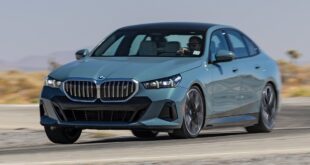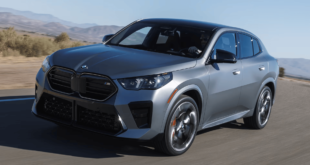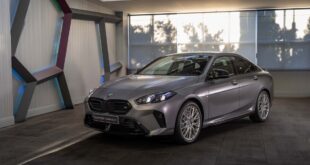Volvo is, admittedly, the benchmark to beat, BMW’s latest X1, chassis code U11, is now set to challenge the Swede’s crown.

Now onto its third iteration and looking all the better for it, BMW’s X1 has had to endure a rather tumultuous path to get to where it is today. While the initial idea for BMW’s first subcompact crossover was perfectly sound and development on the E90 Touring chassis delivered a great drive, its compromised interior space due to its rear-wheel drive layout meant that those looking for a truly-practical Sports Utility Vehicle shopped elsewhere.
When the time came to revamp the X1 for its second outing, BMW looked to its UKL2 platform shared by both the 2 Series MPV, I mean, the 2 Series Active Tourer, and the Mini Countryman. Doing so allowed BMW to fully take advantage of the increased interior room for that much-needed practicality.
While it still drove rather well, being BMW’s first “real” model with the driven wheels up front meant it bore the brunt of many an online detractor, not helped also by its quickly dated interior which felt more Active Tourer than Sports Activity if you know what I mean. That said, sales of the second generation X1 validated BMW’s decision to break with tradition and production spanned a lengthy (for today) 7 years.

This leads us to the U11, still based on the UKL2 platform, still made in Germany and still fitted with BMW’s 3-cylinder turbocharged 1.5-litre powerplant borrowed again from their Mini neighbour. Although in this application it has been detuned to push out only 121 horses (down from 134hp) although torque has interestingly gone up by 10Nm to 230Nm. Why the detune? It all has to do with this pesky thing called COE, which pushes all cars with anything more than 132hp up into the pricier category B, er, category.

Which means that this new X1 should come with a slightly more wallet-friendly price tag right? Well… That depends on your definition of wallet-friendly because at this time of writing, getting your hands on this particular BMW X1 sDrive16i xLine, BMW’s entry-level SUV, will mean parting with 243,888 of your hard-earned Singapore dollars. What does that sizeable (to this writer at least) amount of monies get you? Let’s take a look.


BMW has been getting a LOT of schtick for their aesthetics recently which makes the new X1 somewhat of an outlier because even though it is BMW’s smallest entry into the premium SUV market, it is quite undoubtedly one of their best and most proportionately styled cars on sale today. Dropping the second generation’s curvier exterior for chunkier edges, tauter surfaces and strong, bold vertical lines. Taking on a tough and stylish little robot aesthetic, especially in its electrified iX1 guise.


The U11 has also grown in size, almost matching its G̶o̶t̶h̶e̶n̶b̶u̶r̶g̶ Chengdu rival like for like. With the XC40 only marginally wider (by 1.8cm) and taller (by 1cm) but also shorter in length (by 7.5cm) than the little robot. This increase in external dimensions has, of course, meant an increase in interior space as well, for both humans and cargo (expandable with sliding and folding rear seats too). Allowing everyone inside to enjoy its redesigned interior, now sporting BMW’s ubiquitous curved digital screen atop a clean and modern dashboard layout reminiscent of vehicles higher up the BMW price bracket.



Having said that, if you opt for the M-sport trim for an extra S$2,000 (really a no-brainer), you’d be greeted with not just the sportier external bits but also an anthracite headliner, M Sport leather steering wheel, paddle shifters and Aluminium Hexacube dark trim finishers on the inside.
Unfortunately, while you might get a fancier interior, that extra money spent will not solve one of the X1 (and all of BMW’s “1” cars) biggest pain points, the lack of a rotary controller for the OS 8 iDrive UI. While it operates well and is rather speedy, the problem herein lies with its usability, or rather, lack of it. This is surprising considering how BMW has always nailed their ergonomics.

One does get the sense that this UI was never designed to be used as a touch-screen first system because it is virtually impossible to navigate through the deep-seated menus whilst on the move. And with its minutely sized sub-menu icons requiring quite a bit of dexterity, determination and accuracy to properly punch in to get the correct function when driving.
What that extra money gets you though is, more importantly, M Adaptive suspension. This is something I reckon most buyers should have because the standard damping on this sDrive16i is, to put it nicely, overtly sporty. While the harshness of most uneven surfaces gets ironed out before they get to your posterior, you will still feel every bump of the MCE. It is almost as if the dampers were calibrated to take on a slightly heavier powerplant from the get-go. I’d be happy to trade some of the X1’s agility for a slightly softer ride. But if agility is (strangely) what you are after when it comes to driving, the X1 has got you covered as the stiff dampers work wonders in controlling body roll through the bendiest of bends, allowing you to apply power with confidence as it squares up readily when exiting corners.

Although power is something you’d be wanting a little bit more of because while it does pack a decent amount of poke mid-range with its 230Nm or torques, 121 horses can only do so much to propel this 1575 kg baby SUV even though the chassis feels happy more than capable of taking on more power to deliver some proper driving thrills. A juicy torquey electric motor perhaps?

In conclusion, does the stylish new X1 have what it takes to steal the Volvo XC40’s thunder? Unfortunately, for now, it does not.
While the X1’s premium build quality, great exterior design and dynamic handling left us with enough positive impressions to overlook its ride and counterintuitive infotainment UI, the sDrive16i’s powertrain felt out of its league and is the biggest letdown in a car that initially seemed very promising. And while it is unabashedly stylish and comes adorned with a, let’s face it, more desirable bonnet emblem, the latest BMW X1, even in its better-equipped M-Sport spec is also, still quite an expensive proposition (for a Category A COE vehicle) because, for roughly the same amount of money, you can get behind the wheel of a Turbocharged 2-litre 4-cylinder XC40 Mild Hybrid (S$249,000) or if you don’t mind sacrificing a bit of utility, a Polestar 2 electric (S$240,000). Fork out a tad more and the XC40 Recharge (S$257,000) and Mini Countryman S (S$265,888) will be within reach.
So, round one goes to the Swedes once again, but with the iX1 set to arrive in Singapore shortly (hopefully), we reckon Volvo’s reign at the top might finally come to an end. Wait for it.
What do we love? Its stylish and beautifully proportioned exterior aesthetic and premium feeling cabin.
What are we not too sure about? The price tag despite taking on a Category A COE-friendly detuned engine.
What can be improved? The ride could be better and BMW needs to develop an alternative OS8 UI for touchscreen-only applications.
 BMW.SG | BMW Singapore Owners Community The Ultimate BMW Community – Established Since 2001
BMW.SG | BMW Singapore Owners Community The Ultimate BMW Community – Established Since 2001













